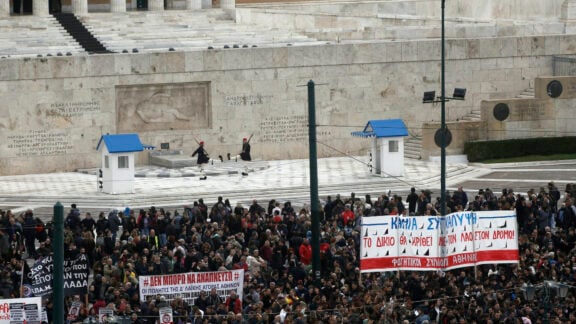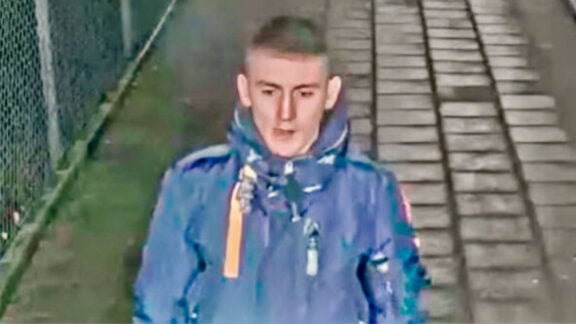From the moment he picked me up, the taxi driver warned me about going to my destination. “You won’t be safe walking around up there,” he protested, insisting that his car would be pelted with stones if he drove into the “gypsy camp”. On top of that, he argued that the assorted debris on the road leading into the Roma settlement at Kato Examilia, outside Corinth, would destroy his tyres.
“This is a new generation of Roma. They want different things.”
Still, I managed to coax him to drive that bit further, so I could see what I’d come to cover: the first public activity of a newly founded group representing youth from this and surrounding Roma settlements. Called Romani Elpida (Romany Hope), the association decided to mark International Roma Day, which falls on April 8, by taking up shovels and brushes to clean up the rubbish on the road into the settlement.
Building rubble, old furniture, clothing and household waste – it has gathered over the years, the result of illegal fly-tipping by non-Roma as well as some Roma. Up to now, appeals to the local municipality to clean up the illegal dump have gone unanswered.
“We didn’t want to mark the day with food and dancing. We wanted to do something more basic, something for the health of the people here and also for their dignity. It’s very significant that we ourselves, the Roma, have decided to clean up our own neighbourhood,” said Sofia Souta, the 30-year-old president of the new association, surrounded by children of all ages gathering rubbish into large black bags.
“Up to now, there’s been a lot of bad press, too many stories about crime, which gives everyone a bad name. Now we’re trying to show something different, to show people who we really are, something that’s never put across,” Souta continues.
About 30 young people have turned out for the spring clean. Among them is Panayiotis, 20, from nearby Zevgolatio. “I came over here to help out so that we can have a better tomorrow,” he says, as he sweeps rubbish off the road, into the path of a mechanical digger sent by the local municipality, which responded to a request from Romani Elpida for help. A large truck was also promised to take away the mounds of rubbish, but it never materialised.
For Maria Kratz-Larsen, a Swedish woman living in the area who has run a children’s education project at the Roma settlement in Examilia since 2009, it’s a “historic day”, as it’s the first time the Roma have organised something for themselves.
“This is a new generation of Roma. They want different things. And this is what they wanted to do. They wanted to raise awareness, which is what International Roma Day is all about,” she says. Her Children’s Ark project runs a pre-school and offers after-school help to older children from the settlement, which has a population of 150 families or 800 individuals, 60 per cent of whom are children. When the project started, there was no running water in the settlement and children were not being vaccinated.
As she explains, some of the children still have it much harder than others, like the ten-year-old girl hugging her leg. “She’s one of our little lambs. Her parents aren’t there for her, so she lives with her grandmother, who takes her into town to beg outside supermarkets, or with other relatives. It remains to be seen whether she’ll continue with school. It will really depend on her,” says Larsen.
Elsewhere, a barefoot ten-year-old, Yiorgos, throws pieces of broken glass into a wheelbarrow.
Many of those participating in the clean-up operation are wearing orange-coloured football jerseys. They’re among the players of the Roma Athletic Academy (or FC Roma), a team which Larsen’s husband Phillip set up for the settlement’s youths.
FC Roma togs out three times a week in the local sports field. Being the newest team, they have to make do with the last available training slot, which is after 8.30 pm. That means it’s midnight by the time Larsen has ferried all the players home. But that – or bad weather – doesn’t stop them from making the effort.
This season they joined the regional league, entering the bottom third division, which has 13 teams. After a series of embarrassing losses at the start – the first game ended in an excruciating 10-0 defeat – Roma FC began winning as it its players gelled into a real team.
“Since Christmas, we’ve won every one of the ten games we’ve played,” Phillip Larsen explains, which is no small feat considering the team is younger and smaller on average than its competitors.
“Our players are mostly aged 14 to 17, while most of the other teams are much older,” he says, adding that the team is the only one in the league that has a clean sheet when it comes to referee bookings. “Ours is the only page in the penalty book that is blank. And we’ll get a reward for that. We’ve proved everybody wrong. All those who were saying the opposite.”
For Larsen, the football pitch is that level playing field that allows the Roma kids perform as equals.
“Once these kids get the chance to prove themselves, on the pitch, having to abide by the same rules as everybody else, having the same chance as everybody else, they really prove to be fair players, good players, talented (and) very organised. It’s beautiful to see how they can succeed if they just have the opportunity and the support from adults and the community.”
All the players say that they want to become professional some day. When asked for which team, one says: “For Greece!”
After a couple of hours work, the volunteers call it a day, somewhat disappointed that the mechanical digger from the municipality only stayed for less than hour and the truck that was supposed to take away the rubbish never turned up.
When contacted by EnetEnglish, Christos Meletis, the deputy mayor responsible for the environment at the municipality said they will complete the work.
Maria Kratz-Larsen really hopes that will be the case. It’s been four years since the Roma first formally petitioned that the municipality clean up the dump outside the settlement. After that official request went unanswered, she had to appeal to the ombudsman.
“We just want the rubbish to be taken away. We’re trying to educate the children about the importance of protecting the environment, but they have all this waste on their doorstep. They’re the ones who pay for it in the end.”
Source: enetenglish








